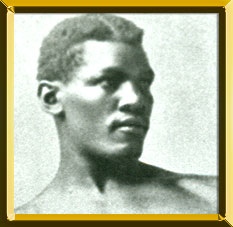
Racial prejudice was the only thing that kept Peter Jackson from his chance to win the world heavyweight crown. A world-class fighter, Jackson was not always granted the kind of competition he deserved. Born in the Virgin Islands, Jackson moved with his family to Australia when he was six years old. When his parents returned to the Caribbean, Jackson stayed in his new homeland. He became an excellent swimmer and diver and found work on ships at the age of fourteen. As a young man, Jackson used his fists to help quell a mutiny, and the incident received attention in the Australian press. Larry Foley, who had also handled Young Griffo, sought Jackson out and started him on his professional career.
Jackson won the Australian heavyweight title in 1886 with a knockout of Tom Leeds in the 30th round. Having difficulty securing bouts in Australia and eager to prove his worth, Jackson traveled to the United States in 1888. However, most top fighters shunned him for racial or competitive reasons. John L. Sullivan, the heavyweight champion and the most famous American boxer, stated, "I will not fight a Negro. I never have, and I never shall." Although Sullivan had actually faced a black opponent previously, he would not change his stance regarding Jackson.
Jackson knocked out George Godfrey, another black fighter, and several white opponents who agreed to fight him as he traveled across the country. He then journeyed to England where he beat Jem Smith in two rounds to claim the championship of the British Empire. Jackson dominated the fight and forced Smith to resort to wrestling to avoid a knockout.
Back in the U.S., Jackson found an adequate foe in future heavyweight champion James J. Corbett. In 1891, at the California Athletic Club in San Francisco, the two battled to a 61-round draw. Jackson displayed great boxing ability, although some observers believed that the 30-year-old fighter's punches were not the incredibly powerful weapons they had once been. Corbett later stated in his autobiography that Jackson could have beaten any heavyweight Corbett ever saw. Over the next several years, Jackson fought when he could obtain a match, acted, and ran a boxing school in London. In 1898, an over-the-hill Jackson lost to future champion James J. Jeffries on a fourth-round knockout. Shortly thereafter, Jackson returned to Australia to fight the tuberculosis which ultimately killed him.
* * *
Excerpted with permission from 'The Boxing Register' by James B. Roberts and Alexander G. Skutt, copyright © 1999 by McBooks Press. All rights reserved.
Born: July 3, 1861
Died: July 13, 1901
Bouts: 85
Won: 45
Lost: 4
Drew: 5
ND: 31
KOs: 30
Induction: 1990
Peter Jackson
